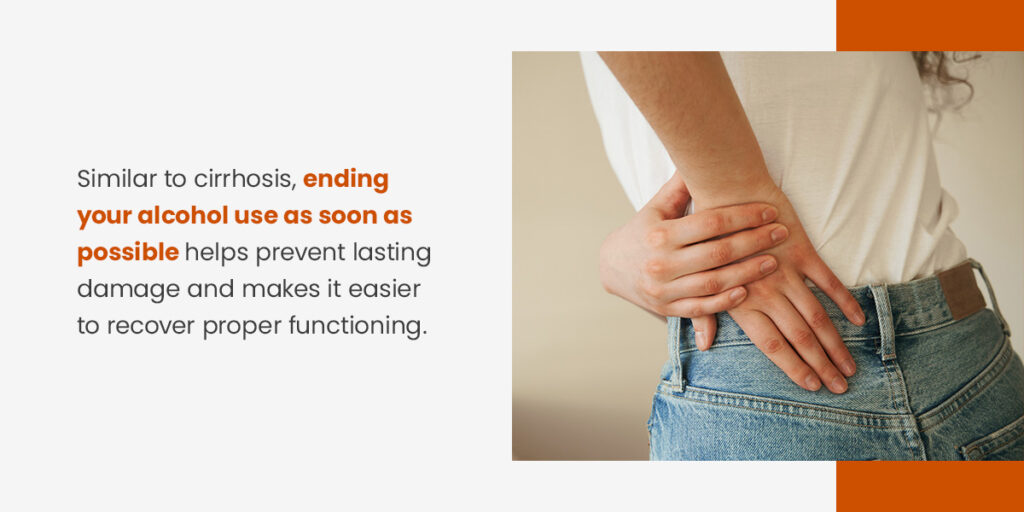How to Reverse Damage of Long-Term Alcohol Abuse
Too much alcohol consumption can damage your body and brain, so abstaining from heavy use is essential. Thankfully, studies show many systems can heal once individuals start to practice sobriety. The human body has an amazing capability to heal itself when supported with proper nutrition and protected from toxic substances like alcohol. With the right practices and support, you can begin to reverse alcohol damage and return to living a healthy, full life.
Can You Reverse Alcohol Damage?
Sobriety is challenging but possible. You can achieve freedom from alcohol dependence if you’re willing to make changes, ask for help and take one step forward at a time. You can reverse many of alcohol’s effects if you change your lifestyle with positive habits.
Fully committing to the recovery process helps you heal faster. Reaching out for professional help is one of the best ways to ensure you reach sobriety and develop habits that can keep you there. You don’t have to heal from your addiction alone — you are much stronger with a community behind you.
During withdrawal, it can be especially important to work with medical professionals. You may have to navigate mild to extreme withdrawal symptoms, and a professional can help you handle these symptoms so you have the strength to continue recovery. Learning more about the connection between your body and mind helps you create and practice healthier habits moving forward.
There’s nothing like healthy relationships to help you heal. When you encounter compassion, kindness and warmth from others at your lowest point, you’ll find the strength you need to change your life and become someone you can be truly proud of. Rehab and support groups can help you and your family navigate the strain of healing from an addiction to alcohol — and its underlying cause.
Am I at Risk for Alcohol Use Disorder?
According to the National Survey on Drug Use and Health, 29.5 million Americans over 12 experienced alcohol addiction in 2022. If you’re a woman and have seven or more drinks a week, you’re at risk for developing alcohol use disorder (AUD). Men are at risk if they have 14 or more drinks a week — although some people may become addicted with fewer, depending on their physiology. Over time, alcohol addiction can significantly harm the body — including your brain, heart, liver and nervous system.
How Does Alcohol Affect the Body?
When you drink alcohol, your body has to work to convert the ethanol in your drink into usable energy. This process is hard on your body, as it exposes the cells in your liver and other organ systems to toxic substances. When you experience a hangover, it’s your body eliminating those toxins and working to reset your physical systems so you can stay healthy.
Negative Impacts of Drinking Alcohol
Alcohol negatively impacts every system in your body and is essentially a toxin. Abstaining from alcohol has a massively positive impact on every system in your body, from your heart to your liver, brain health and your immune system.
1. Cognitive Functioning and Nerve Damage

When an individual drinks, alcohol hinders the brain’s ability to control speech, balance, judgment and memory. It also causes long-term effects by shrinking neurons. It can cause or intensify the symptoms of mental health conditions such as anxiety, and it can increase a person’s risk of developing dementia, a disease that affects memory.
Long-term alcohol use can also cause alcoholic neuropathy, which damages peripheral nerves. A person with alcoholic neuropathy may experience numbness, tingling sensations, muscle weakness and cramps. Some nerve damage is permanent, but sobriety typically improves most neuropathy symptoms and helps prevent further damage.
2. Hormonal Imbalances, Cardiovascular Complications and a Suppressed Immune System
Alcohol use can significantly increase your cortisol levels. Cortisol is a hormone your body produces to regulate nearly all of your body’s organs and functions, helping the body do the following:
- Regulate stress responses
- Suppress inflammation
- Regulate metabolism for proper fat, carbohydrate and protein use within the body
- Regulate blood pressure and sugar
- Control the sleep cycle
Alcohol raises cortisol levels and makes it harder for the body to control factors such as blood pressure and metabolism. With raised cortisol levels, you may be at higher risk of hypertension or heart weakness. You may also gain more weight than usual due to a slower metabolism.
Your immune system functioning may decrease with heavy or regular alcohol use, which increases your chances of becoming ill. It can also raise your risk of developing the following types of cancer:
- Throat
- Mouth
- Esophagus
- Breast
- Liver
- Voice box
- Rectum
- Colon
How Long Does It Take for Hormones to Balance After Quitting Alcohol?

Most individuals experience reduced cortisol levels within days of quitting alcohol, improving their sleep patterns and stress levels. Sex hormones typically start to balance within a few weeks of sobriety, improving a person’s well-being and mood. However, heavier alcohol use can extend the time it takes for hormones to balance. If you use alcohol heavily or have been using it for a long time, your hormones may start to balance within several months of ending your alcohol use.
How Long Does It Take for the Immune System to Recover From Alcohol Use?
It usually takes the immune system several months to fully recover from heavy or prolonged alcohol use. However, some individuals find that it takes a couple of years for their immune system to return to normal. You can help your immune system recover faster by taking care of your body with healthy food, proper sleep and physical activity.
3. Liver and Kidney Functioning
Your liver is the organ most sensitive to drinking-related damage. In your body, the liver works to filter out toxins. If it becomes overloaded, a type of scarring called cirrhosis can occur. Too much scarring can reduce the organ’s function and put your life in danger from toxic overload.
Your kidneys are also susceptible to damage when you drink alcohol. The kidneys help filter toxins out of your blood, and excessive alcohol use can change how they function. Drinking too much alcohol may lead to chronic kidney disease, which hinders the kidneys’ ability to filter your blood.
Can Liver Functioning Improve After Alcohol Damage?
Mild to moderate liver damage can heal after heavy alcohol use, but more severe damage is permanent. Cirrhosis is the final stage of liver damage, and advanced cirrhosis is usually irreversible. Some people may require a liver transplant to survive their alcohol use disorder, but you can avoid a transplant by ending alcohol use before it causes significant damage.
Can Kidneys Recover From Alcohol Damage?

Severe kidney damage can be permanent, but many cases of kidney damage can heal with quality care and abstinence from alcohol use. Similar to cirrhosis, ending your alcohol use as soon as possible helps prevent lasting damage and makes it easier to recover proper functioning.
Benefits of Not Drinking Alcohol
When you choose to abstain from alcohol, you’ll start to see benefits very quickly. Your body will filter out the remaining toxins from your last drink and get to work on healing itself. Of course, everyone’s healing journey is different. People who are heavy drinkers may experience stressful or even dangerous withdrawal symptoms, and many need professional help to detox safely.
A good rule of thumb is to start by drinking less. Even drinking one fewer drink a week is a step in the right direction. If you find this difficult, you’ll know it’s time to seek professional help and a support group. It can be difficult to near impossible to break an addiction on your own. You have a higher chance of success if you enlist the help of other people early on in the process.
How to Heal Your Body From Alcohol
The first and most important step to reverse the effects of alcohol is to achieve sobriety. This means you are completely free from alcohol use in day-to-day life. When you eliminate alcohol from your diet, your brain and body have a chance to heal itself. The longer you avoid drinking, the healthier your body will become.
There are several other impactful steps you can take to recover after an alcohol dependency. Eating healthy food and improving your nutrition gives your body the building blocks it needs to regenerate cells and heal. You can also consider detox programs and working with a medical professional to help you make progress as quickly as possible.
1. Exercise
Working out has incredible benefits for your body and can help balance your hormones and improve brain health. It releases dopamine in the brain that boosts your mood in a natural, healthy way. Over the long term, exercise improves blood flow and positively affects every system in your body — the opposite effect of drinking too much alcohol! Every time you exercise, you invest in your body and its healing journey.
2. Positive Choices
Pursuing hobbies is one way to regain joy and interest in your life. Other ways to improve your mental health include finding a community of people who share similar interests, listening to calming music, spending time in nature and engaging in genuine laughter. Every positive choice you make adds up — eventually, you may find you don’t crave alcohol anymore.
If you decide you want to change, it’s possible to completely turn your life around.
3. Treatment
Investing in your physical body with special treatments can also help you heal. Seeking help from a professional rehab facility can give you the support you need when you first start out. Completing a 30-day treatment program can make a major difference, especially at the beginning of your journey. Some people partake in additional treatments like NAD+ IV therapy, which can help support your body during detox.
Many people drink too much because they struggle with relationships, finances or other personal stressors. Alcohol may feel like an easy way to numb, especially if you deal with chronic anxiety, depression or loneliness. However, as long as you’re drinking too much, you’ll never be able to heal the underlying cause that drives this self-destructive behavior.
The Role of Family and Friends in Alcohol Recovery
If your family member or friend is currently in alcohol recovery treatment, your support in their life is more important than ever as they journey toward healing. It can be hard to know how you can help — here is a closer look at your role in their recovery.
A Family’s Role
Families are often directly affected and play a prominent and pivotal role in alcohol use recovery. Whether the recovering individual is your spouse, child or parent, your unconditional love will help them stay positive and prevent relapse.
We recommend the following advice when it comes to assisting a loved one through their recovery program:
- Educate yourself on addiction: Recognizing alcohol abuse as a chronic condition can help you better understand your loved one’s situation. As a family member, you likely have a shared history and can recognize patterns from the past to empathize with their struggles.
- Set healthy boundaries: The recovery process can be challenging for you and your loved one. They may have hurt you in the past, and establishing a clear boundary will help you protect yourself while healing alongside them.
- Provide a stable environment: Family members can offer consistency and deep emotional support during the recovery process. When communicating with your loved one, be open to listening without judgment and avoid accusatory statements.
- Participate in treatment: As a family member, you will likely be able to participate and support your loved one in informed treatment decisions. It’s important to be prepared for resistance from your loved one — facing recovery is difficult, and your compassion and patience with them benefit their healing.
A Friend’s Role
A friend plays a distinct role in an individual’s alcohol recovery, as they can fill in the gaps that family members may overlook. Here are some places to start:
- Offer social support: Friends offer a connection to reality and life away from a treatment plan. Visit them often to reduce their feelings of isolation and work behind the scenes to create a social circle that encourages sobriety.
- Encourage healthy behaviors: A friend is the ultimate accountability partner. Throughout your friend’s recovery, celebrate their milestones and help motivate them to stick to their goals.
- Provide a safe space: Sometimes, familial relationships can be complex, and the recovering individual may need an additional emotional outlet. Offer a listening ear to your friend as a nonjudgmental, safe space for feelings and challenges.
- Introduce flexibility and fun: When your friend is home from their recovery program, they will need new distractions and ways to have fun without relapsing. As a friend, you can offer a more flexible and fun approach to recovery, introducing healthier habits and hobbies.
Heal From Alcohol Abuse at The Sanctuary at Sedona
Alcohol significantly affects the entire body. From your sleep patterns to your heart and liver functioning, heavy alcohol use can lead to several health conditions with serious symptoms. A supportive recovery program can help you restore your overall well-being and happiness.
Are you ready to heal? Reach out to The Sanctuary at Sedona and take the first step toward a healthy future today. With our holistic approach, you can heal and even reverse the negative effects of alcohol on your body. Sanctuary at Sedona offers a multifaceted approach to help you heal quickly — one that includes exercise, community, nutrition support and counseling.
Find freedom from alcohol so you can recover your sense of identity. There is joy on the other side of addiction if you are willing to walk through sobriety and healing first. Don’t wait to start this journey — the sooner you receive treatment, the less damage your body will have to work through, and the faster you can begin living a life you’re proud of. Contact us today to learn more!
He is the Founder, Administrator, Counselor at the Sanctuary at Sedona. He has a BA in Political Science and is currently Senior teaching staff at Four Winds Society, an international school of energy medicine. His credentials also include being an Ordained Minister; a Certified Shamanic Breathwork® Facilitator; a Founding Member Society for Shamanic Practitioners; a Member of Association for Comprehensive Energy Psychology; a Member of the National Institute for Holistic Addiction Studies. [email protected]

